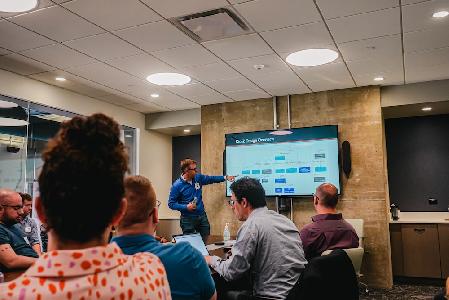For a one-man operation, getting 100 people to user-test your new computer game is no simple task. Getting 100 people to test it in person, while you hold down a full time job is even harder.
But that’s exactly the type of feedback process OriGamInc founder Shawn Pierre thinks he needs to make “ToneDef: Revenge of the Squarebots” a really good computer game. So far he’s had about 20 people test his game in person, Pierre told Technically Philly, some of them at the Unity Game Developers Expo during Philly Tech Week.
“I heard that Final Form Games had at least 100 people play test their game Jamestown and that game is really, really good,” said Pierre.”So I would say that 100 sounds really good.”
To sign up to play test ToneDef in person click here.
In the name of journalism, of course, this reporter met Pierre at Elixr last week to play test ToneDef, a game that requires using musical instruments, like snare drums and high hats, and musical notation devices, like codas and rests, to protect an unseen fortress from takeover by a variety of square, mischievous bots.
The game is somewhat musically complex — you sort of need to understand basic music notation to get a lot of the features — but it’s whimsical, too. The more musical instruments you introduce as fortification, the more points you earn to use new musical weapons and the more robust the music in each level or “movement” becomes.
The toughest part of the game is understanding the concept: Why does music kill mustachioed or monocled robots?
“The enemies are called Squarebots because it’s not hip to be a square. You don’t like music,” Pierre said. “When you’re uncool, people call you a square.”
It’s more imaginative than logical, which works for a video game. Once you start playing, though, the strategy feels a little more intuitive and the speed, coupled with an intensifying soundtrack, can get you caught up in the gameplay.
Pierre, 24, says he has been working on the game since February, largely working by himself using Unity, a game development software commonly used by independent game developers. He’s also composed all the music in the game, drawing on highschool and college experience.
Coding solo means he doesn’t have a whole lot of time to work on the game once he gets done working his full-time tech support job at Pobox, an email service in Center City, and commuting back to Mt. Airy where he lives.
Pierre says he’s tried to find a partner to share the work, but so far nothing has worked out.
“I went to a couple people and said, ‘Hey, do you want to work on this with me?’ and they said ‘Sure, sounds kinda cool.'” But eventually things failed and we never even started to work on it,” Pierre said. “So I just decided to go for this by myself.
To find user testers willing to test the game, Pierre has tried to use the Independent Game Developers Association (IGDA) listserv. He says the organization has been useful for finding professional advice, but it hasn’t worked as well for finding users because he can’t track how many people play the game and most never send him feedback. That’s part of the reason why Pierre is so committed to meeting all 100 testers — even if a tester never says a word, he says he can learn a lot by just watching them play.
Pierre is also applying to game festivals in an effort to find more users. So far he’s applied to festivals in Baltimore, Los Angeles and Seattle and has been accepted to Artscape Baltimore.
If you’ve never user tested a video game before, here are the top three things Pierre looks for when he’s watching a tester:
1. Facial Expression and in situ reactions: “I looked for moments where they were clicking and expecting moment “x” to happen, and found that either “y” happened, or nothing at all occurred. To me, this reads as either what I did was too confusing, or there was something that someone would naturally assume would happen that wasn’t included…Furrowed brows aren’t necessarily bad, but they lead me to think that something is odd.”
2. Criticism and explanation: ” I would like more testers to explain ‘why’ when they criticize or compliment an element of the game. For example, if someone says “I don’t like this,” but doesn’t have a further reasoning for that statement, it becomes more difficult to find out how to change that area.”
3. Suggestions and feature requests: “Of course, it’s not their job to design the game, [but] someone else’s input is invaluable. Even if I do not fully agree with what they have to say, their suggestion may even spawn off a new idea. So, people who have a lot to say about everything would make great play testers for me.”
To sign up to play test ToneDef in person click here.
Join the conversation!
Find news, events, jobs and people who share your interests on Technical.ly's open community Slack

Philly daily roundup: Student-made college cost app; Central High is robotics world champ; Internet subsidy expiration looms

Philly daily roundup: Earth Day glossary; Gen AI's energy cost; Biotech incubator in Horsham

Philly daily roundup: Women's health startup wins pitch; $204M for internet access; 'GamingWalls' for sports venues




